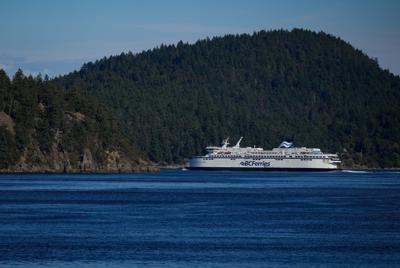Say this for the outrage of BC Ferries preparing to spend an estimated $1 billion to buy four ferries from China, a country doing great injury to Prairie farmers and to fishers in Atlantic Canada and B.C. by imposing tariffs on roughly $4 billion of imported Canadian canola, seafood and pork.
It gives the Carney government a bargaining chip to help negotiate an end to our trade dispute with China by suspending the ferry deal at least for now.
Canada provoked the trade war last year when it put tariffs on imported Chinese electric vehicles, steel and aluminum.
One conflict with a major trading partner at a time, please, as we try to protect ourselves from harm inflicted by the annexationist Trump administrationÔÇÖs economic assault on Canada.
Say this, too. BC Ferries ordered the ships from China because there isnÔÇÖt a shipyard in Canada that can compete with ChinaÔÇÖs low-cost shipyards.
The governmentÔÇÖs National Shipbuilding Strategy to reinvigorate the sector, unveiled in 2010, apparently didnÔÇÖt include creating Canadian shipyards capable of building world-class cost-competitive ferries.
When BC Ferries called for bids on the new ships last September, Seaspan, a Canadian shipbuilder based in North Vancouver, B.C., issued a statement saying ÔÇťCanadian shipyards and their supply chains cannot compete with low-wage countries that have lower employment standards, lower environmental standards and lower safety standards than Canada and B.C.ÔÇŁ
Seaspan is building ships for the Royal Canadian Navy and the Canadian Coast Guard. It hopes someday to have the capability ÔÇťto build future B.C. ferries here at home.ÔÇŁ
So, add that to Prime Minister Mark CarneyÔÇÖs list of nation-building projects┬áÔÇö an upgrade to our shipyards in B.C., Quebec and Nova Scotia to make them the most efficient in the world.
For now, the worldÔÇÖs leading ferry builders include ItalyÔÇÖs Fincantieri, AustraliaÔÇÖs Incat Tasmania, and FinlandÔÇÖs Aker Finnyards, besides BC FerriesÔÇÖ chosen supplier, the Chinese state-owned China Merchants Industry Weihai Shipyards.
The first three of those are in countries that are allies of Canada. Whatever happened to ÔÇťfriendshoring,ÔÇŁ buying from countries with values like ours?
It is to weep. Canada boasts more ocean coastline and contains more fresh water than any country. Yet it has no shipyards able to compete with China.
LetÔÇÖs fix that in time to supply BC Ferries and P.E.I., which included a new ferry on its wish list when the premiers met with Carney to discuss needed nation-building projects.
And a third issue revealed by this controversy is the sad state of BC Ferries, a Canadian national asset.
BC Ferries is one of the worldÔÇÖs biggest ferry services, with 25 routes providing critical links among the B.C. mainland, Vancouver Island and many smaller island communities.
Last year, BC FerriesÔÇÖ 37 ships carried 21.6 million people and eight million vehicles.┬á
And it needs a massive overhaul.
Essential though it is, the service is chronically underfunded, loses money on most of its routes, and operates a fleet of aging ships badly in need of replacement.
BC Ferries also requires a change in governance. From the time it was semi-privatized in 2003, BC Ferries has been unaccountable and non-transparent.
Successive NDP and Liberal provincial governments have been satisfied with that arrangement. It enables governments to deflect criticism of the service.
B.C. Premier David Eby, his transport minister and, for good measure, the federal transport minister, Chrystia Freeland, have all spoken against the planned Chinese ferry purchase.
ÔÇťIÔÇÖm not happy with the result,ÔÇŁ Eby said of BC FerriesÔÇÖ purchase decision. ÔÇťI want ferries built here at home in Canada.ÔÇŁ
But Eby says he has no authority to intervene in BC FerriesÔÇÖ affairs.
Which is nonsense.
B.C. is the sole shareholder of BC Ferries. Its fares are set by a provincial regulator. The province subsidizes BC Ferries, whose capital spending┬áÔÇö including the purchase of new ferries┬áÔÇö is subject to approval by its provincial overseer, the BC Ferry Commission.
A drop of acid in the eye is that the Chinese purchase is to be financed with a low-interest loan from the Canadian Infrastructure Bank (CIB), a federal agency.
And EbyÔÇÖs government this year legislated local procurement by the B.C. government and ÔÇťgovernment procurement agenciesÔÇŁ┬áÔÇö a laudable, if in this instance ineffectual, contribution to the ÔÇťBuy CanadaÔÇŁ movement in response to the U.S. tariff assault.
ItÔÇÖs been widely said that Canada is on a wartime footing, engaged as we are in trade conflicts with our two largest trading partners.
As such, Carney should suspend the CIB loan to BC Ferries, which he can do with a phone call. Doing so would be consistent with the pause Carney has placed on CanadaÔÇÖs planned purchase of an additional 72 U.S.-made F-35 jet fighters.┬á
And something you can do: In this summer of discovering Canada, travel BC FerriesÔÇÖ most direct route from Vancouver to Victoria. You will experience one of the most delightful immersions in paradise on Earth.
Happy Canada Day Week.



























To join the conversation set a first and last name in your user profile.
Sign in or register for free to join the Conversation